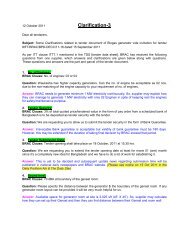Combining health and social protection measures to reach the ultra ...
Combining health and social protection measures to reach the ultra ...
Combining health and social protection measures to reach the ultra ...
- No tags were found...
Create successful ePaper yourself
Turn your PDF publications into a flip-book with our unique Google optimized e-Paper software.
Research resourcespoliomyelitis <strong>and</strong> given <strong>the</strong> particular success of <strong>the</strong> Cubanvaccination strategy, several investigations supporting globalpolio eradication have been conducted in our country at <strong>the</strong>request of <strong>the</strong> World Health Organization (WHO) <strong>and</strong> <strong>the</strong>Pan American Health Organization (PAHO), allowingdemonstration of <strong>the</strong> circulation-time of <strong>the</strong> vaccine viruses in<strong>the</strong> environment after <strong>the</strong> oral vaccination <strong>and</strong> <strong>the</strong> immunityof <strong>the</strong> inactivated vaccine. This new knowledge <strong>and</strong> <strong>the</strong>investigations in course will allow improved definition of <strong>the</strong>strategy for global polio vaccination after eradication 25 . Newfindings of global impact related <strong>to</strong> dengue hemorrhagic fever(DHF), have been reported by Cuban scientists. Theconfirmation of secondary infection as a risk fac<strong>to</strong>r for DHF,<strong>the</strong> influence of <strong>the</strong> interval between infections <strong>and</strong> <strong>the</strong> roleof ethnicity <strong>and</strong> chronic diseases are only some examples 20 .Flexibility also characterizes Cuban science, allowingincorporation of new <strong>to</strong>pics in <strong>the</strong> research agenda dependingon <strong>the</strong> epidemiological national <strong>and</strong> international situation.The preparation of <strong>the</strong> country in terms of surveillance,diagnosis <strong>and</strong> research <strong>to</strong> face new global epidemics such asWest Nile Fever, SARS <strong>and</strong> Avian Flu are recent examples.Current research needs <strong>and</strong> agendaAt present, <strong>the</strong> Cuban population shows a very high <strong>health</strong>level with <strong>the</strong> Millennium Development Goals alreadyaccomplished 26,27,28 . However, <strong>the</strong> country is working <strong>to</strong> <strong>reach</strong>new goals, with an infant mortality ratio of less than fivedeaths per 1000 live births, life expectancy at birth of 80years <strong>and</strong> quality of life improvement being <strong>the</strong> mostimportant new targets. At this new stage, research occupiesa leading place due <strong>to</strong> its direct impact on <strong>health</strong>development. To achieve <strong>the</strong>se new goals, differentinvestigations are under development, notable ones beingactive screening of risk groups <strong>and</strong> of <strong>the</strong> open population fordiseases that are <strong>the</strong> major causes of mortality. Theseinvestigations will allow early detection of <strong>the</strong> illness in order<strong>to</strong> apply <strong>the</strong> appropriate treatment <strong>and</strong> management ofpatients, avoiding disability <strong>and</strong> death. Supporting this newstrategy, <strong>the</strong> accessibility of <strong>the</strong> <strong>health</strong> system has increasedby <strong>the</strong> introduction of advanced technology at <strong>the</strong> primaryheath care level.A <strong>to</strong>tally different <strong>health</strong> picture is observed in many o<strong>the</strong>rpoor countries. According <strong>to</strong> WHO, <strong>and</strong> as an example, Africashows an infant mortality per 1000 live births of 100, a lifeexpectancy at birth of 47 years for males <strong>and</strong> 49 for females,<strong>and</strong> HIV/AIDS <strong>and</strong> TB constitute major causes ofmortality 29,30,31 . Due <strong>to</strong> this serious situation, a new agenda forresearch <strong>and</strong> <strong>the</strong> implementation of research findings isneeded at <strong>the</strong> global level. In this sense, Cuba is developinga new model of regional <strong>and</strong> international cooperation in<strong>health</strong>, education <strong>and</strong> science. Currently, <strong>the</strong> country hosts22 000 students from developing countries in its medicalschools <strong>and</strong> more than 32 000 Cuban collabora<strong>to</strong>rs labour inmore than 80 countries. From <strong>the</strong> 1960s, more than132 000 <strong>health</strong> workers collaborated in 102 countries of <strong>the</strong>developing world. This model of collaboration is having adirect impact on streng<strong>the</strong>ning human capacities, <strong>the</strong>development of scientific research <strong>and</strong> public <strong>health</strong>. ❏Gustavo Kourí is a researcher, professor <strong>and</strong> Vice-President of<strong>the</strong> Cuban Academy of Science. He is also Direc<strong>to</strong>r General of <strong>the</strong>Institu<strong>to</strong> Medicina Tropical Pedro Kourí in Havana, Cuba.María G Guzmán is a researcher, professor <strong>and</strong> Direc<strong>to</strong>r of <strong>the</strong>WHO/PAHO Collaborative Centre for Dengue study <strong>and</strong> its vec<strong>to</strong>r.She is Chief of <strong>the</strong> Virology Department at <strong>the</strong> Institu<strong>to</strong> MedicinaTropical Pedro Kourí in Havana, Cuba, <strong>and</strong> is a Member of <strong>the</strong>Cuban Academy of Science.José Luis Pelegrino is a researcher, professor <strong>and</strong> a Master inVirology. He is also a research coordina<strong>to</strong>r <strong>and</strong> a member of staffof <strong>the</strong> WHO/PAHO Collabora<strong>to</strong>r Centre for Dengue <strong>and</strong> its vec<strong>to</strong>r.He is also on <strong>the</strong> staff of <strong>the</strong> Institu<strong>to</strong> Medicina Tropical PedroKourí in Havana, Cuba.Alicia Reyes is an economist <strong>and</strong> Vice-Direc<strong>to</strong>r of <strong>the</strong> Institu<strong>to</strong>Medicina Tropical Pedro Kourí in Havana, Cuba.Luis Estruch is a researcher, professor <strong>and</strong> epidemiologist,Cuban Ministry of Health.Niviola Cabrera is a professor <strong>and</strong> National Direc<strong>to</strong>r for Science<strong>and</strong> Technology, Cuban Ministry of Health.114 ✜ Global Forum Update on Research for Health Volume 4


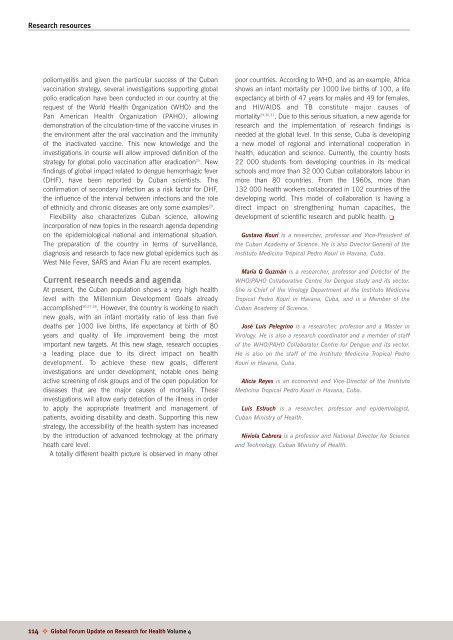
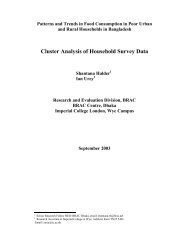
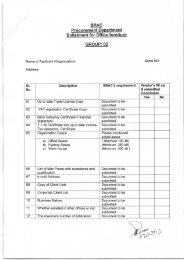
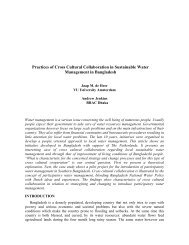
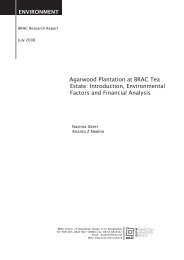
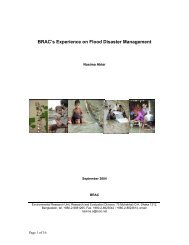
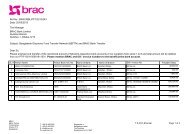
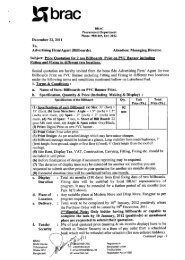
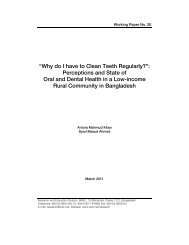
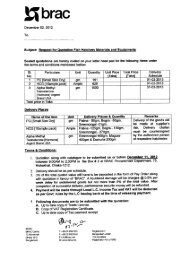

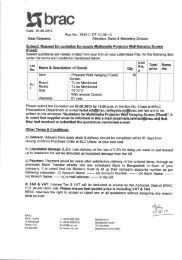
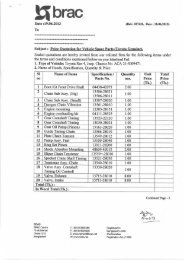
![[re-tender] RFQ for supply of Diesel Generator - Brac](https://img.yumpu.com/44421374/1/186x260/re-tender-rfq-for-supply-of-diesel-generator-brac.jpg?quality=85)
